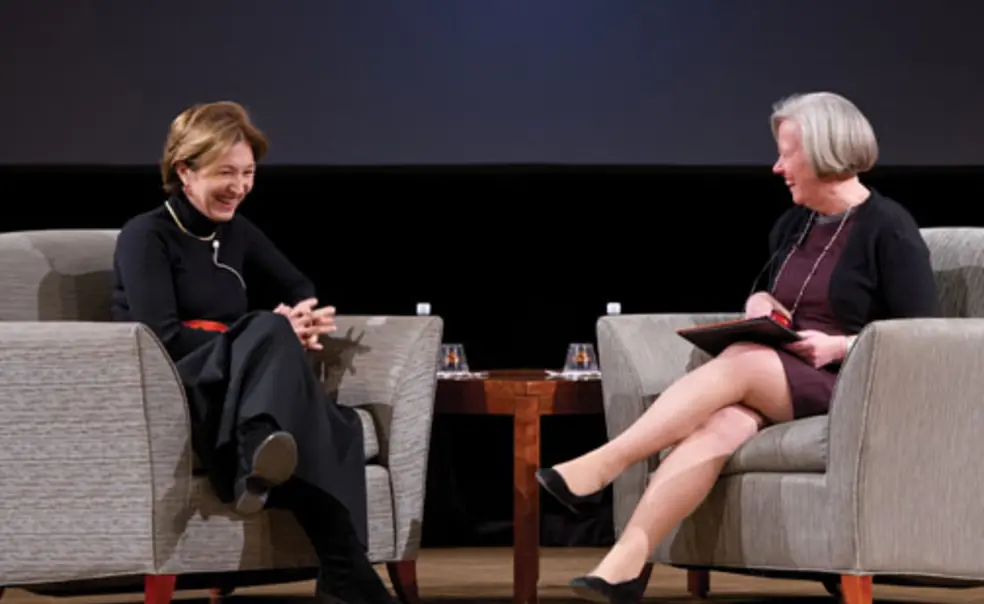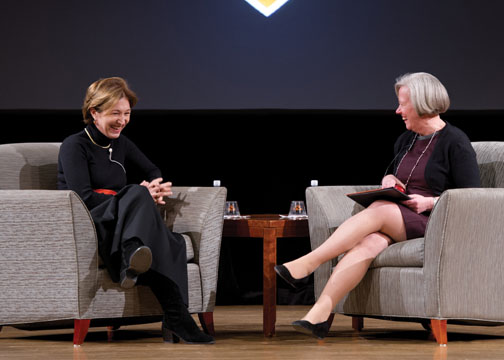Can women have it all? A conversation continues
Anne-Marie Slaughter ’80 is one of the most prominent women on the Princeton faculty, but as an undergraduate she was afraid to seek out high-profile positions, she said in a conversation with President Tilghman on women’s leadership and work-life balance.
As an undergraduate, “I didn’t dare really try for anything that would have put me in a leadership position,” such as student government or The Daily Princetonian, Slaughter said at the event Feb. 22, the eve of Alumni Day. “I was too scared to try ... I didn’t think I was a leader until between [the ages of] 35 and 40.” Referring to a 2011 study that found female Princeton undergraduates were underrepresented in the most visible leadership positions, she added, “I want to say to young women, ‘Try being out front.’”
Slaughter, the Bert G. Kerstetter ’66 University Professor of Politics and International Affairs, has become a leading figure in the debate over why women still lag behind men in leadership positions since her cover story in The Atlantic, “Why Women Still Can’t Have it All,” was published last summer.
“Every generation has to have this conversation,” Slaughter said, pointing out, in the audience of more than 500 people in Richardson Auditorium, Lisa Belkin ’82, author of a much-discussed 2003 article, “The Opt-Out Revolution.” The article described Princeton-educated women who were quitting high-powered careers. Young women today “grew up absolutely being told they could do anything,” Slaughter said. “They’re looking at women ahead of them and they are saying, ‘This doesn’t look so easy, and I want better choices.’”
Tilghman brought up Sheryl Sandberg, the COO of Facebook, who has said that women hold themselves back from becoming leaders.
Slaughter lamented that female students at Princeton are “not raising their hand as much, not pushing as much,” adding, “We do have to combat the ways in which we are socialized.” She agreed with Sandberg that “there are many barriers in the workplace,” and recalled her inability to get women promoted when she worked for two years as the director of policy planning at the State Department.
Slaughter has put more blame on employers for failing to adopt family-friendly policies.
Tilghman said: “In general, women are allowed a narrower personality range than men. You cannot afford to be shy and retiring, because that will be stereotyped, nor can you afford to be at the other end of the spectrum with those sharp elbows. ... Neither of those extremes are problematic for men.”
The conversation continued after the event at a networking reception for students and alumni at Chancellor Green, where Stephanie Schnabel ’87 said she worried that Slaughter’s message was too negative. “Women in college may take a more defeatist attitude and think they have to choose between career and family,” she said. “We owe it to the next generation to chip away at the problem.”
Iveta Gigova *96 said what was left out of the conversation was “maternal instincts. I’m the one juggling child-care arrangements, partly because of maternal instincts and partly because of how my husband and I were raised.”
Others were dismayed that younger women must continue to grapple with these issues. Said Belkin: “I’m astounded that we are still discussing this!”













No responses yet